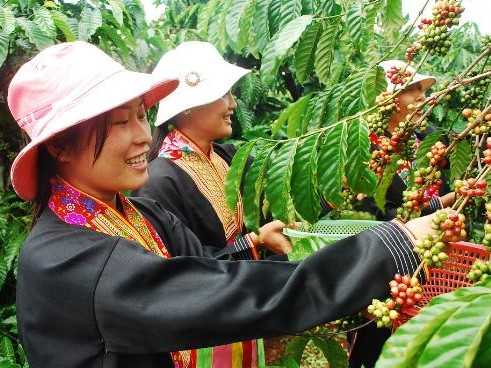The Robusta price in the past had climbed to as much as VND50 million per ton, which helped many farmers get rich. However, it has tumbled dramatically to below production cost. No organization has forecast a bright future for the coffee industry in 2016.
Nguyen Van Phu, 40, a farmer in Dak Lak province, said his coffee output last year was 10 percent lower than years before before because of the drought. However, the worst aspect for him is the sharp price fall.
Dry Robusta is now traded at VND36 million per ton, much lower than the highest peak of VND50 million per ton seen some years ago.
“We cannot make profit with such a price. Meanwhile, we have to pay for bank loan interest to replant 40 percent of old coffee area,” he said.
Hoang Tung Minh, 35, in Bao Loc Town of Lam Dong province, said it had not been raining in the last month in Bao Loc. The drought has affected his 2.5 hectares of coffee
“I will have my coffee field watered if it does not rain in some days,” he said, adding that he does not think much about the watering cost, but feels worried if there is water to irrigate the field.
According to the Vietnam Coffee and Cocoa Association (Vicofa), in the 2014-2015 crop, Vietnam had 617,700 hectares of coffee growing area which put out 1.5 million tons of coffee beans, or 20 percent lower than the years before.
Vicofa attributed the output decrease to El Nino which led to the drought. Meanwhile, the coffee replantation program is going slowly, and the old coffee area has increased.
The coffee output decrease not only occurred in Vietnam, but in the world as well. Vicofa said the world’s output was 141 million bags in 2014-2015, or 8.5 million tons, down by 3.5 percent.
However, Nguyen Viet Vinh, Vicofa’s secretary general, cannot understand “why the price keeps decreasing despite the output reduction. ”
He said the coffee price had not gone up and down in accordance with supply and demand, but with the finance market performance.
A report of the Ministry of Agriculture and Rural Development (MARD) found that the coffee export turnover in 2015 decreased sharply by 28 percent.
Vietnam coffee exports have become less attractive to importers because Brazil, Columbia and Indonesia – Vietnam’s main rivals – have devalued their currencies sharply.
International organizations all noted that although the coffee output decreases in the world, the inventory level keeps increasing.
In Vietnam, Bloomberg estimated that farmers still had 50,000 tons of coffee by the end of September 2015, while exporters in HCM City had kept 192,000 tons.














